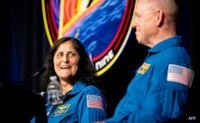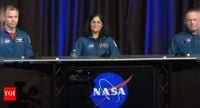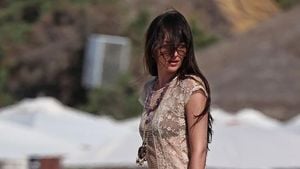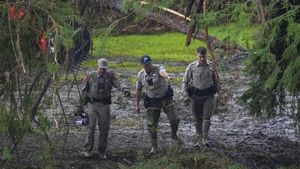Sunita Williams, the Indian-origin NASA astronaut, has returned to Earth after an impressive 286 days aboard the International Space Station (ISS). Her first media interaction post-return, held on March 31, 2025, was filled with awe-inspiring recollections of viewing India from space. Williams, whose roots trace back to India, shared vivid descriptions of the country’s landscape as seen from orbit, highlighting her deep connection to her heritage.
During her time in space, one of the standout moments for Williams was witnessing the majestic Himalayas from above. Each time the ISS passed over this iconic mountain range, she and fellow astronaut Butch Wilmore were mesmerized. "Every time we went over the Himalayas, Butch got incredible pictures; it’s just amazing," Williams remarked, illustrating the breathtaking scenes they experienced. The Himalayas, she noted, were not just visually stunning during the day but also at night, serving as a remarkable backdrop to her views of India.
Williams also expressed admiration for the western coastline of India, particularly the Mumbai-Gujarat region. She described how the fishing fleets off the coast served as a visual beacon, providing a sense of arrival as the ISS approached the subcontinent. "When you are coming from the east, to get into Gujarat and Mumbai, the fishing fleet off the shore there gives you a little sense of a beacon that here we come," she explained. This imagery painted a picture of the vibrant coastal life and the interconnectedness of the country’s cities.
Her fascination extended beyond mere visuals; Williams reflected on the geological marvel that is India. She described the land as having a rippling appearance, a result of tectonic plate collisions that shaped the unique landscape. "It’s like this ripple that happened, obviously when the plates collided, and then as it flowed down into India," she observed, captivated by the variety of colors displayed—from earthy mountain tones to lush green forests.
In her heartfelt statements, Williams expressed a strong desire to reconnect with her Indian roots. "I hope, and I think for sure, I’m gonna be going back to my father’s home country and visiting with people," she said, emphasizing her eagerness to engage with the culture and people of India. This sentiment reflects not only her personal connection but also a broader cultural identity that she cherishes.
Moreover, Williams was enthusiastic about the upcoming Axiom mission, which is set to feature Indian Air Force test pilot and ISRO astronaut Subhanshu Shukla. She described Shukla's participation as a significant milestone for India in the realm of space exploration. "It’s pretty awesome to see the Indian space program developing at such a rapid pace," Williams said, recognizing the growing international collaboration in space endeavors.
Sunita Williams’ journey back to Earth was marked by a historic 286-day mission, significantly longer than the originally planned eight days. Complications during their mission extended their stay aboard the ISS, but they successfully completed the Crew-10 mission and returned on March 19, 2025. Upon their return, Williams and her fellow astronauts, including Nick Hague and Aleksandr Gorbunov, were welcomed back by Indian Prime Minister Narendra Modi and a crowd of supporters, celebrating their remarkable achievements in space.
Reflecting on her experiences, Williams noted the striking contrast of India’s vibrant cities as seen from space. "All throughout India, I think the impression that I had was this network of lights, with large cities shining brightly and connecting through the smaller towns," she stated, emphasizing the beauty of the country from a celestial perspective. This network of lights, she noted, was equally stunning both during the day and night, with the Himalayas serving as a prominent feature in the background.
Williams, who has often spoken about her Indian heritage, proudly shared her family history during the media interaction. Her father, Deepak Pandya, was born in Gujarat and moved to the United States in 1958 for his medical career. Growing up in Ohio, Williams has maintained a strong connection to her roots, often expressing pride in her Indian heritage. This cultural identity has shaped her experiences as an astronaut and her perspective on space exploration.
As she looks forward to potential collaborations with the Indian Space Research Organisation (ISRO), Williams expressed her hope to share her experiences with people in India. "I hope we can meet up at some point and share our experiences with as many people in India as possible because it is a great country and another wonderful democracy," she said, underscoring her commitment to fostering international cooperation in space exploration.
With her recent return from a lengthy mission, Williams is now focused on readjusting to life on Earth. She has already begun physical therapy to help her body reacclimate to gravity, a standard procedure for astronauts returning from extended space missions. During the press conference, both Williams and Wilmore appeared in high spirits, with Williams even sharing that she had gone for a 3-mile run just days after returning.
Sunita Williams’ extraordinary journey and her reflections on India from space highlight not only her personal achievements but also the potential for future collaboration between nations in the field of space exploration. As she prepares for her next steps, her story serves as an inspiration for aspiring astronauts and a testament to the importance of cultural connections in the realm of scientific discovery.





